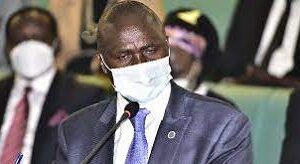Bukomansimbi Woman MP, Ms. Nanyondo, recently announced her decision to withdraw her signature from a censure motion against four backbench commissioners of Parliament. In a letter addressed to Speaker Anita Among, Ms. Nanyondo cited deception and misunderstanding regarding the document she had previously signed.

Veronica Nanyondo and the president of NUP Kyagulanyi Robert
Deception and Misunderstanding
Ms. Nanyondo, a member of the National Unity Platform (NUP), explained that she had been misled into signing what she believed was an attendance list for a meeting called by the Leader of the Opposition. She later realized it was a censure list aimed at four backbench commissioners.
“I respectfully write to notify you of my intention to withdraw my signature from the motion seeking to censor four backbench commissioners of Parliament,” she stated. Ms. Nanyondo emphasized her intention to rectify the situation by officially withdrawing her support for the motion.
The Initial Signing
Nanyondo admitted that she attended the Opposition meeting that took place on Tuesday morning but did not read through the document before signing. “As you know, I arrived late at the meeting and the issue of censure was not mentioned, but various other issues were discussed. The list I signed, I thought it was for an attendance list,” she said.
Reaction from the NRM Caucus
Herbert Kinobere, the Member of Parliament for Kibuku County and Vice Spokesperson of the NRM Caucus, instructed NRM MPs not to sign the censure motion against the commissioners until they receive guidance from their party chairman, President Museveni. Kinobere warned that MPs who had already signed might be asked to withdraw their signatures once they receive the president’s guidance.
Allegations Against Commissioners
The motion to censure the four backbench commissioners, led by Lwemiyaga County MP Theodore Ssekikubo, accused them of abuse of office and misconduct. The allegations involved the distribution of Shs1.7 billion among themselves as a service award. Ssekikubo stated that over 120 lawmakers had signed the censure motion papers and expressed hope that the required 177 signatures to table and debate the motion in Parliament would be collected.
In conculsion, the controversy surrounding the censure motion highlights the ongoing political dynamics within the Ugandan Parliament. MPs are urged to consider the implications of their signatures and the importance of addressing corruption to maintain the integrity of the 11th Parliament.



























